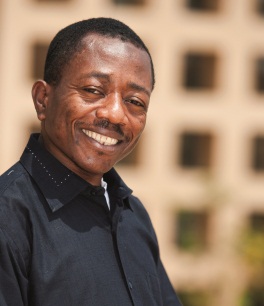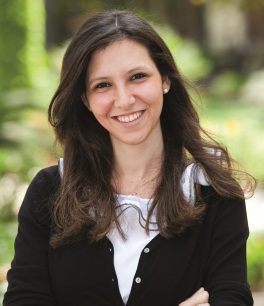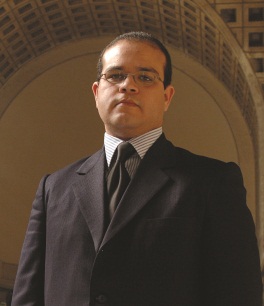LEADING LAWYERS By Sarah Topol
Working as a corporate lawyer at an international law firm in Italy, Dina Hashish (MA ’08) has learned to be versatile when dealing with the law. “When you’re working with legal regulations from different countries, it’s important to understand local laws, local practice and the interplay between them, as well as how to be in compliance with international standards,” said Hashish. “There’s this rush when working in capital market deals because you’re part of a big transaction with all its challenges. A company wants to raise money and you want to see how to structure the deal for the benefit of your client, how to work with different regulations and regulators, and how to stay in compliance with global standards.” Hashish, a graduate of AUC’s Ibrahim Shihata Memorial Master of Laws (LLM) program in international and comparative law, credits her ability to look at the law from a plurality of perspectives to her studies at the university. “The classes were very helpful in terms of providing us with a much needed comparative outlook,” said Hashish, who pursued postgraduate studies at Stanford University. AUC’s LLM program is the first in the Arab world to offer Americanstyle legal education with specializations in Islamic and comparative law, international law, and international economic and corporate law. It is named in memory of the late Ibrahim Shihata, who singled out legal education as the core obstacle to advancing the rule of law and ensuring the region’s development. Supporting the program, the Arab Fund for Economic Development made a $1 million grant to AUC, creating an endowment in international and comparative law, and the OPEC Fund for International Development made a $300,000 grant. Since its inception six years ago, the LLM program has succeeded in placing its alumni at top graduate schools including Harvard, Columbia, Stanford, Northwestern and London’s School of Oriental and African Studies. Like Hashish, graduates of the program now serve in the global professional market as corporate lawyers, international civil servants and legal experts in governmental and non-governmental organizations, ministries, transnational corporations and international organizations such as the World Bank, International Monetary Fund and the World Trade Organization. “We are looking at legal education as a way of preparing students to think and work globally as legal practitioners and intellectuals,” said Thomas Skouteris, director of the LLM program. “We use a lot of Socratic teaching, which you do not find readily in European, African or Middle Eastern universities. Students give oral presentations, write text briefs and papers, and stage mock court cases. It’s not just a question of studying the rules and learning about their content, but to be able to think critically about the social function of the law, the policies and ideologies behind the law.” In September 2010, the program will implement a newly recalibrated curriculum and will offer internships for credit with law firms and international organizations. “This provides students with a practical learning experience, gives them an opportunity to connect and form networks, and increases their chances of finding good jobs after they graduate,” said Hani Sayed, chair of the law department. It is this strong academic grounding that LLM graduates like Mahmoud Moustafa (MA ’06), who graduated top of his class at AUC, treasure the most. “I have always been trained in the French legal system, which I found to be very different from the American one,” said Moustafa, who is pursuing his PhD in law from the University of London and currently works as a lawyer at an American law firm in Egypt, as well as lecturer of legal theory and alternative dispute resolution. “With the American system, I became more legally tolerant. I’m now better at serving my clients because I’m able to wear different legal hats more comfortably.” In addition to the LLM program, AUC also offers a Master of Law in international human rights law (IHRL). With an extensive network of contacts throughout Africa and the Middle East, the program prepares its graduates to work in humanitarian organizations or governmental departments and agencies concerned with human rights and humanitarian issues. “I enjoyed the thought-provoking and interactive class debates at AUC on the cultural-relativist approaches to burning issues of the law such as feminism, women’s rights, gay rights, and individual versus collective rights,” said Ray Wung (MA ’10), an African fellow and graduate of the IHRL program who will pursue postgraduate studies at Harvard Law School in the fall. “This is an approach I missed in the formal, tutorial style that was used in my law studies in Africa. ... With a strong base in human rights law, I now plan to venture into more substantive and contemporary legal and human rights issues at Harvard, particularly as they relate to the environment, energy and natural resources, and the human rights implications of global climate change. Such issues are of critical importance to the international community especially Africa, which is endowed with lots of natural resources, but lagging in economic growth. My dream is to utilize the law to have a lasting, positive impact on my country and continent.” |
||||||||||
General counsel and senior vice president of the World Bank from 1983 to 1998, the late Ibrahim Shihata was a well-known lawyer and international jurist. AUC’s LLM program, named in memory of Shihata, takes inspiration from his career and scholarly contributions. Shihata was an expert on global development and was highly committed to poverty reduction as a humanistic cause. During his tenure at the World Bank, he played a major role in the establishment of the Multilateral Investment Guarantee Agency to promote investment in developing countries and the U.S.- based Global Environment Facility, which implements environmentally friendly programs. For 11 years, Shihata served as secretary-general of the Washington-based International Center for the Settlement of Investment Disputes and chair of the International Development Law Institute in Rome. A prolific author on legal issues, Shihata wrote 30 books and more than 200 essays. Shihata graduated from Cairo University’s law school in 1957 and earned his doctorate in juridical science from Harvard University in 1964. He worked for two years as a faculty member at Ain Shams University, after which he served as legal adviser and general counsel to the Kuwait Fund for Arab Economic Development. He then became the first director general of the OPEC Fund as well as the executive board director of the International Fund for Agricultural Development. For years, he guided research efforts as trustee of the Washington Institute on International and Foreign Trade Law and the Oxford-based Center of Research on the New International Economic Order. Shortly before his death, Shihata was awarded the highest academic tribute received by scholars. A Liber Amicorum, a book of essays written by more than 40 prominent scholars, friends and colleagues, was presented to him at the World Bank for his contributions to the law of international finance and development. |
||||||||||


